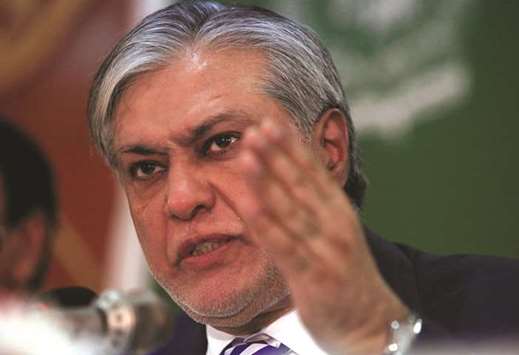Analysts will be closely watching Dar’s final budget before the 2018 election for any clues about populist giveaways and to see if his government will maintain the macroeconomic discipline that has helped stabilise the economy in recent years.
Dar said estimated growth in 2016/2017 (July 1-June 30) had been driven by a rebound in agriculture, with the sector growing 3.5% compared with 0.3% a year earlier, and supported by steady performance of the services sector, which expanded 6%.
“Pakistan is in the midst of an economic revival,” Dar said in a statement detailing the 2016/2017 Pakistan Economic Survey.
He also told media that Pakistan would be targeting a 6% growth target for 2017/2018.
In the past few years, the government has missed such targets, including the 5.7% aimed for in 2016/2017.
Pakistan’s economy needs to grow at more than 6% a year to absorb new entrants coming into the workforce in a fast-growing population of nearly 200mn people, experts say.
Pakistan in September concluded a three-year IMF bailout programme stemming from a balance of payments crisis in 2013, and Dar said Pakistan had no plans to go back to the IMF despite a ballooning current account deficit.
He estimated the current account gap would reach $8.3bn in 2016/2017, from $2.5bn the previous year.
The spike has been mainly attributed to machinery imports for power plants and infrastructure projects linked to the Beijing-funded China-Pakistan Economic Corridor, which is a flagship project in China’s vast Belt and Road initiative.
Dar also rejected assertions by some analysts that Pakistan’s currency is overvalued by 20%.
“If anything, it is not (overvalued) more than 5%,” he said.
He added that public debt stood at 59% of GDP as of March, while the value of Pakistan’s economy had increased to just over $300bn.
Analysts say today’s budget will focus on spurring growth ahead of the 2018 election, with Prime Minister Nawaz Sharif’s government continuing to spend heavily on infrastructure and tightening tax collection efforts to pay for the spending plans.
Vahaj Ahmed, research analyst at investment bank Exotix Partners, said he also expected Islamabad to maintain fertiliser subsidies to the agricultural sector, and possibly waive a general sales tax (GST) on agricultural inputs, to help growth.
Citi, in a research note, said the 2017/2018 budget this week will be a “litmus test of the government’s fiscal intentions” before the 2018 poll, expected in May next year.
Topline Securities, a brokerage, said in an analyst note it expected the total 2017/2018 budget to be about 7% higher than last year, at Rs4.7tn rupees.
Topline said Dar was likely to target a budget deficit of about 3.5%, while the 2016/2017 deficit gap was expected to exceed 4%.
Govt promises more relief for exporters
Pakistan’s Commerce Secretary Mohamed Younus Dagha has announced that more relief will be given to exporters in the upcoming federal budget, acknowledging that exports of the country are facing a challenging situation.
“The government is committed to providing relief to export-oriented industries to arrest the decline in shipments,” he said, adding duties and taxes had already been reduced on raw material being used in the industries.
Speaking at the Lahore Chamber of Commerce and Industry (LCCI) yesterday, Dagha pledged to promote consultation with the private sector to make policies more effective, believing that policies framed in isolation could not give desired results.
“Government wants to give the same incentives in the budget to the export-oriented industry as are being given by the competitors,” he said while pointing out that all economic indicators were good apart from exports.
Foreign exchange reserves are at high levels, mark-up and inflation are at the lowest while the industry is facing no load-shedding. He stressed that the Strategic Trade Policy Framework 2015-18 was being improved as it had not produced expected results.
Saying that lack of research and development work in the agriculture sector was a major bottleneck, he asked the private sector to join hands with the government as joint ventures and collaboration in the food sector could help exploit its huge potential.
LCCI President Abdul Basit called for dealing with the factors restricting economic growth in the country.
“Pakistan’s exports fell to $21.9bn in 2016 from $24.1bn in 2015.
A 5% decline has been registered in exports of the manufacturing sector including carpet, sports goods and surgical instruments,” he said.
Voicing concern, he pointed out that exports to 89 countries had gone down after they started importing goods from other countries.
He cited high cost of doing business and energy prices compared to regional competitors as factors that were destroying the comparative advantage of Pakistan.
Basit emphasised the need for value addition and promotion of light engineering industry in order to gain the greatest advantage from the global market.

